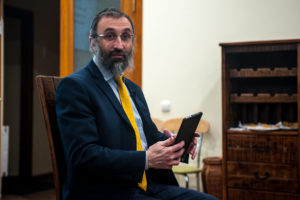It might be unexpected to see a synagogue for Russian-speaking Jews advocating for the aid of Ukrainian Jews, especially in the face of Russia’s invasion of Ukraine. But for the members of the ARIEL Jewish Center, their duty as Jews is to help others, no matter where they’re from.

The center has been holding a number of fundraisers to aid Ukrainian refugees, and particularly Ukrainian Jews, fleeing the country. Most recently, their Purim festival’s profits went toward the Ukraine Jewish Relief Fund maintained by Chabad-Lubavitch emissaries from inside the country.
The center is primarily populated by European Jews, with most being from Russia. Many at the center are from other Eastern European countries but may have immigrated to the U.S. while they were still under Soviet rule.
They also have a large population of Ukrainian congregants, many of whom have friends and relatives in the country that they are worried about. The events held by the ARIEL Center are meant to help assuage those worries by fostering communication between its congregants and those in Ukraine and providing aid to them.
“We have a very large number of constituents born in Ukraine, and we obviously have a large number of people in our community who were born in Russia,” said Rabbi Velvel Belinsky, the ARIEL Center’s rabbi. “And we have congregants from America whose parents were born in Ukraine and Russia, or who have relatives in Ukraine.”
The center’s services, events and part of their website are all in Russian, providing a welcoming community for Russian-speaking Jews.
Russia’s invasion of Ukraine in February of 2022 shocked the world. According to the People’s Dispatch, Russian Americans became the target of misdirected blame for the invasion and for Russia’s continuing action against Ukraine.
But in both Russia and the U.S., a strong anti-war movement began to emerge among Russians. The ARIEL Center is just one of many taking action to aid Ukrainians, particularly Jews, fleeing the country.
“I was doing a lot of work in the beginning stages of this war,” said Belinsky of his earlier efforts. “Through Chabad rabbis, I was able to connect people here with their relatives and friends in Ukraine because lines of communication often would not work. People would not know what was going on with their friends and relatives.”
The Leningrad-born rabbi is a shaliach (emissary or official representative) of the Chabad Lubavitch movement, which has been working to aid Ukrainian refugees and the country’s Jewish community.
But the idea of aiding Ukraine carries a lot of baggage for some members of the ARIEL Center and the local Russian Jewish community, who have mixed feelings about Ukraine’s past treatment of Jews. Belinsky noted that in the past, many Ukrainian Jews would actually emigrate to Russia due to Ukraine’s history of antisemitism.
“Any war’s a tragedy, any invasion is a tragedy, any occupation is a tragedy … so Jews are disturbed by this war,” he said. “But at the same time, many still carry with them the trauma of their experiences in Ukraine.”
Though Putin’s claims that the invasion of Ukraine was to snuff out neo-Nazi presence in the country can be considered a false flag, the country still has an antisemitism problem. In January of 2017, nationalists held a march where they called for the removal of Jews from the country. And the country’s most famous paramilitary organization, the Azov Battalion, has been accused of upholding neo-Nazi sentiment hundreds of times.
But Belinsky says that while European Jews’ qualms with Ukraine’s history are valid, they must set them aside to fulfill the Torah’s commandments to help others who need it.
The congregants of the ARIEL Center come together to stand against Putin’s actions. They continue to hold fundraisers and to collect donations for the Ukraine Jewish Relief Fund. They help Ukrainian Jews as fellow Jews and as people who have faced similar oppression in the past, rather than as residents of two warring countries.
“We know that our mission in this world is to try to make a better place, and whenever we see an area where we can help, it is our obligation to do so. This is why we feel that it is important to help those who are suffering right now in Ukraine,” Belinsky said.






